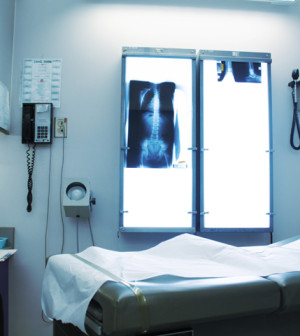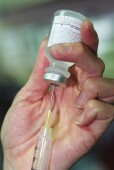- 7 Best Breads for Maintaining Stable Blood Sugar
- Gelatin vs. Collagen: Which is Best for Skin, Nails, and Joints?
- The Long-Term Effects of Daily Turmeric Supplements on Liver Health
- Could Your Grocery Store Meat Be Causing Recurring UTIs?
- Are You Making This Expensive Thermostat Error This Winter?
- Recognizing the Signs of Hypothyroidism
- 10 Strategies to Overcome Insomnia
- Could Artificial Sweeteners Be Aging the Brain Faster?
- Techniques for Soothing Your Nervous System
- Does the Water in Your House Smell Funny? Here’s Why
Study Supports HPV Vaccination Guidelines


New research finds that young women who get the HPV vaccine gain significant protection against infection in three parts of the body if they haven’t already been exposed to the human papillomavirus.
“HPV is a local infection that can separately infect the cervical, anal, or oral sites, where it can occasionally lead to cancer,” said Daniel Beachler, a postdoctoral fellow at the U.S. National Cancer Institute. “This study demonstrates that the HPV 16/18 vaccine provides protection at all three sites, particularly among women without evidence of HPV exposure prior to vaccination.”
Beachler also said that even those previously exposed to the virus may gain a benefit. “While the HPV vaccine is not therapeutic and cannot help clear current infections, we did observe that it may help protect some women previously exposed to HPV against subsequent infection at their non-infected sites,” he said in a news release from the American Association for Cancer Research (AACR).
The study is scheduled for presentation Tuesday at the annual meeting of the AACR in Philadelphia. Research presented at conferences is usually considered preliminary until published in a peer-reviewed medical journal.
The study involved more than 4,100 women in Costa Rica, aged 18 to 25. Half were assigned to get the HPV vaccine while the others received an inactive placebo.
The researchers found that the vaccine was 83 percent effective in all three body sites among women without apparent HPV exposure, and 58 percent effective among women who had been exposed to the virus.
However, Beachler pointed out that the analysis was a one-time sampling of oral and anal HPV infection four years after vaccination. “Further research and better understanding of HPV infection outside of the cervix is needed,” he said.
Three HPV vaccines are now available, Beachler said. These vaccines — Cervarix, Gardasil and Gardasil 9 — should be given as a series of three shots over six months, according to the U.S. Centers for Disease Control and Prevention.
U.S. guidelines recommend that girls aged 11 to 12 get the HPV vaccine to help prevent cervical cancer. For someone who hasn’t been vaccinated, guidelines recommend vaccination through the age of 26.
Gardasil and Gardasil 9 also protect against genital warts and anal cancer in both females and males, according to the CDC.
Despite these guidelines, only half of females under age 18 have been vaccinated in the United States, the study authors said in the news release.
More information
The U.S. Centers for Disease Control and Prevention has details about HPV vaccination.
Source: HealthDay
Copyright © 2026 HealthDay. All rights reserved.










